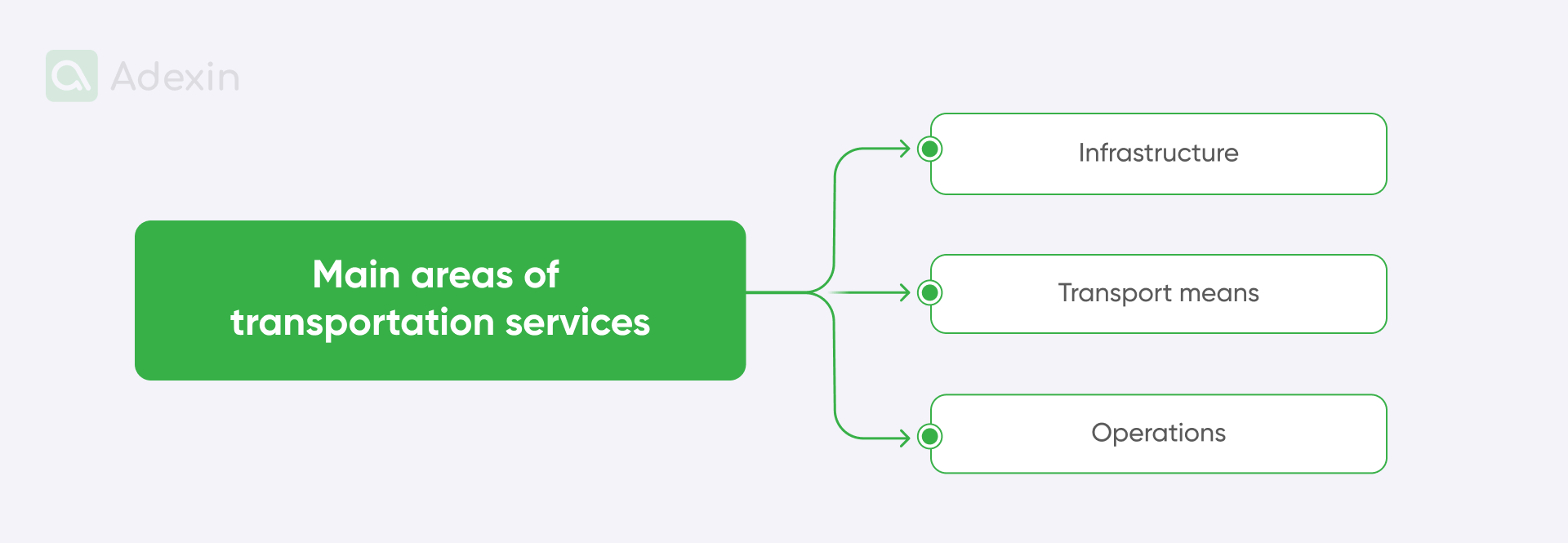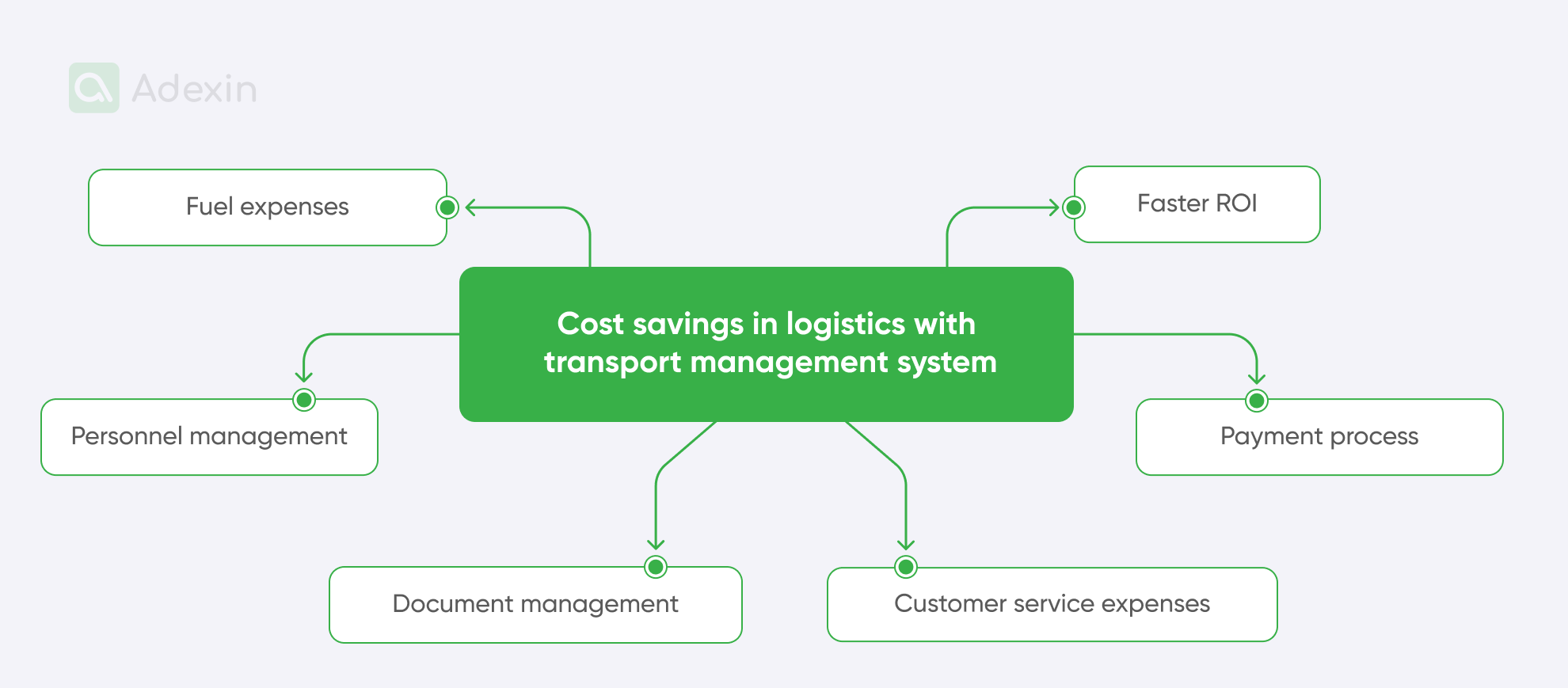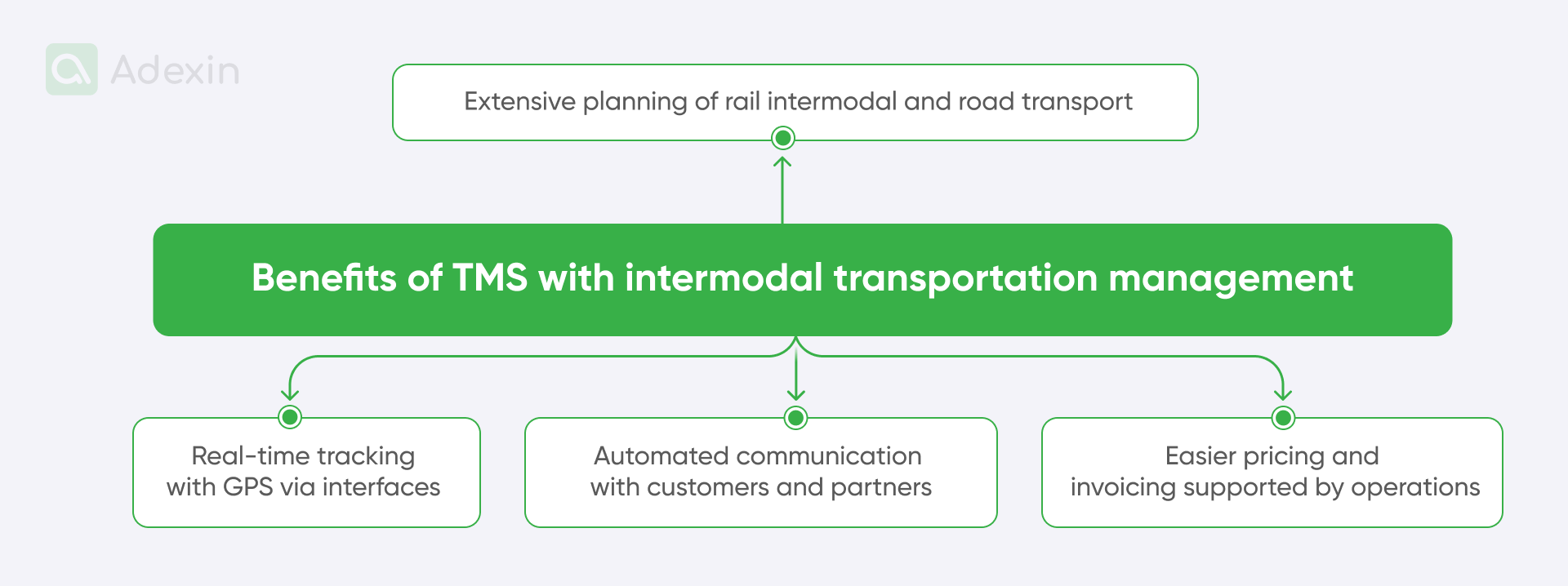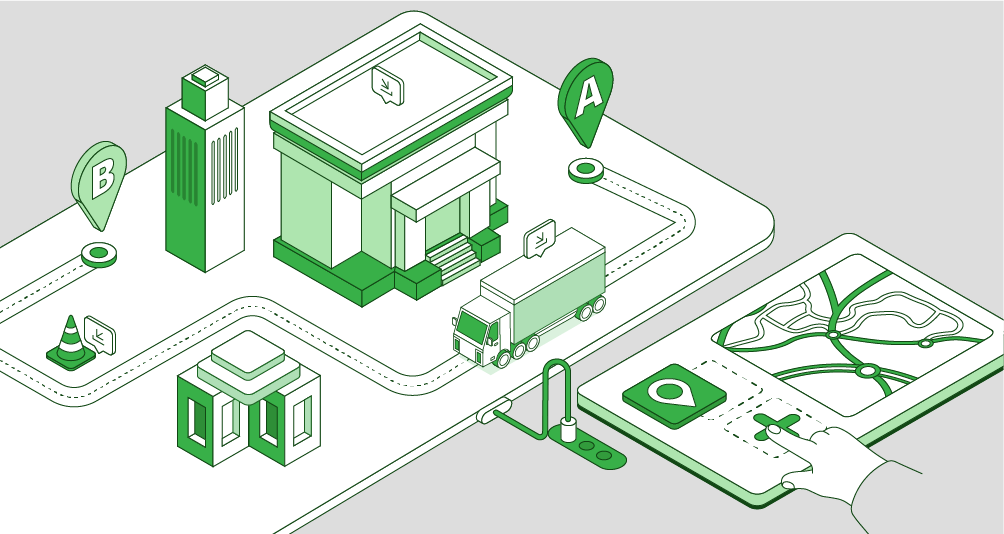The implementation of TMS transportation management can bring substantial benefits to your business. Your logistics and supply chain management operations can take advantage of reduced costs, time savings, and improved efficiency. To clarify how TMS can optimize your logistics business, we have outlined the ultimate benefits. It should make it easier for you to make decisions about transforming your logistics and supply chain operations for the better. Let's delve into this article and explore the impressive capabilities of TMS.
What are the basics of TMS and the main areas of transportation services?
For many involved in day-to-day transport operations, it shouldn't be challenging to differentiate between a transport management system (TMS) and transportation services. Both terms are interlinked and interdependent, but they are concerned with something else. TMS is a strict software solution for transport, logistics, and supply chain management. When discussing transportation services management, these encompass a broad spectrum of approaches for transport management, extensively managed within TMS software.

We can point out the three main areas of transportation services:
Infrastructure
Within logistics, supply chain, and transportation, infrastructure is crucial for smoothly managing all activities. Warehouses and distribution centers need to adapt to the needs of everyday logistics and the supply chain. Facilities should have docks capable of unloading various cargo, where there will be typical trailers or containers.
Transport means
This area covers various types of vehicles such as flatbed freight trucks, refrigerated trucks, tankers, step-deck freight, car carriers, and, apart from road transport, also includes rail transport. Furthermore, it has sea transport with container ships, vessels, barges, and ferries, as well as air transport with cargo aircraft.
Operations
Here, various cargo requirements come to light that require multiple ways of utilizing different transport means, including intermodal, which may utilize both rail transport and road transport. In every case, there is a need to plan transportation routes, schedules, and various loading variants and integrate this with warehouse and distribution operations within the supply chain.
This area of transportation services qualifies for substantial requirements for TMS. Knowing this may help you better understand where transportation, logistics, or typical supply chain businesses can benefit most from TMS. It is why we have outlined the ultimate benefits to assist you in navigating this landscape more effectively.
Lower costs with a logistics transport management system
One of the main benefits of using TMS is that it lowers costs for overall transportation, logistics, and supply chain activities. Here, you can find the main areas where these cost savings are most significant for your operations:

Fuel expenses
Route optimization, an unlimited feature in TMS, allows for cutting fuel costs through better-planned routes. It helps avoid traffic jams or getting stuck on roads under construction. TMS assists in scheduling the sequential unloading of trailers by automatically planning the next points on their routes.
Personnel management
TMS automates many tasks, reducing the need for manual labor. People can save hours by using well-structured workflows for planning transport within an integrated system architecture across the entire business ecosystem. This solution lowers the overall costs of the time dedicated to performing specific tasks.
Document management
TMS, with its built-in function for digital document management, improves document flow, which significantly influences the reduction of costs for preparing documents as well as saving hours for document exchange management and approvals.
Customer service expenses
Handling issues arising from customer complaints based on delays, lost packages, or pallets is a common challenge for every transportation, logistics, and supply chain company. TMS helps prevent any of these root causes that can lead to lower customer satisfaction while minimizing the time required for handling such issues by customer service.
Payment process
TMS automates the invoicing process and payments while handling disputed invoice issues and their resolution. It is how companies can save time and money in a well-secured chain of financial operations. Whether reporting expenses or payments, you can cut costs and streamline operations with TMS.
Faster ROI
In many cases, investing in various systems for logistics and transportation management within the supply chain brings difficulties in calculating return on investment. Everything becomes much more complicated, but with TMS, you can turn your investment into fast returns based on data analysis and forecasting capabilities.
Last but not least, to emphasize this, we would like to highlight that all the benefits are, in the same way, either time or cost-saving. Additionally, we specify, for each area, where these benefits for the company are more evident within TMS. TMS can encompass operational specifications as a vast part of transportation services. One of the major areas of operations within logistics, transportation, and the supply chain refers to intermodal management systems.
Intermodal transport is a method of moving goods using multiple modes of transportation for a single destination. It involves the seamless cargo transfer between different transportation modes, such as trucks, trains, ships, and airplanes.

Here are the benefits of TMS with intermodal transportation management:
Extensive planning of rail intermodal and road transport
Real-time tracking with GPS via interfaces
Automated communication with customers and partners
Easier pricing and invoicing supported by operations
Time savings with route planning software
Route planning is another part of the TMS that brings enormous value to the entire transportation, logistics, and supply chain industries. With the route planning feature built into TMS software, you can reach the extensive potential of your network.
Here are the main benefits of TMS route planning software:
Time efficiency. TMS route planning ensures on-time delivery for all your shipments.
Emissions reduction. You can plan the most suitable routes with lower CO2 emissions.
Improved customer service. Accurate route planning in the TMS results in more reliable delivery times.
Real-time updates. TMS allows you to track your fleet and deliveries in real-time.
Safety. TMS can reduce accidents on the road and help you promote a safe environment.
Regulatory compliance. A TMS can help ensure compliance with regulations and restrictions.
Resource optimization. TMS can support you with drivers and vehicle scheduling.
Data analysis. TMS incorporates data analysis in your work ecosystem to help make decisions and improve efficiency.
Scalability. The TMS can help your business adapt to changing requirements, making it suitable for companies of all sizes and accommodating growth.

Increased control over spending within integrated transportation management
One of the best benefits of TMS is that it integrates all transportation services into a stable ecosystem. Therefore, you can get the most out of your business within a single solution, often proposed based on the TMS platform. Platformization or platform hype has become an incredibly popular trend as it supports all stakeholders within transportation, logistics, and the supply chain, providing everyone with essential information always in one place and at the same level of data accuracy.
Nevertheless, a TMS platform offers two ways of implementation. Companies can go along with a commercial off-the-shelf (COTS) solution that offers only basic features within the platform, but it can still be good enough to handle various transportation issues. Another way is to use custom transportation software development solutions, which are far better tailored to particular business needs. In both cases, you can benefit from extensive transportation management solutions.
Here are the main components that can be integrated with the TMS platform:
Warehouse management systems (WMS). TMS can integrate with WMS software, which improves inventory and order management planning.
Inventory management systems (IMS). IMS can integrate with TMS software for real-time inventory monitoring. It can ensure you with optimal stock levels and cost savings.
Order management systems (OMS). TMS integration with OMS enhances order visibility and streamlines your order fulfillment.
Integrated scheduling. TMS simplifies scheduling for both loading and unloading, and this is the way that TMS supports your inbound and outbound operations to prevent delays or missed time windows.
Telematic integration. TMS can integrate with various hardware components, such as tachometers, providing you with real-time tracking and data-sharing improvements.
Integration with third-party APIs. TMS platform can integrate with third-party APIs, enabling your business access to real-time data for better decision-making across your supply chain ecosystem.
Better control over carriers leveraged by freight management solutions
Here is the point where we can dive a bit deeper into integration with Third-party APIs. It is the point at which TMS enables you to have better control over carriers. The reason is apparent: as a transportation, logistics, or supply chain company, you benefit extensively by using subcontractors. It is the model in the supply chain that actually benefits all parties involved, as various companies can have a closer influence on transportation at each stage.
Here are the benefits of carrier management within TMS:
Automated carrier qualification. TMS allows for automatic assessment and qualification of carriers to reduce risk at both the carrier and cargo levels.
Communication with carriers through the portal. TMS can enable carriers to interact seamlessly online. It eliminates the need for expensive and time-consuming APIs or EDI.
Create contracts effortlessly. TMS can have a built-in function for document management. You obtain carrier rates and automatically generate contracts to simplify carrier selection.
Optimized multimodal visibility. With TMS, you can effortlessly oversee all cross-modal resources to ensure a positive customer experience and keep all stakeholders well-informed.
Need help with transport management systems development?
We are happy to assist you
Explore moreFinale takeaway
In short, TMS solutions offer extensive benefits for transportation, logistics, and supply chain operations. We provided you with this overview of transportation management systems (TMS) and their fundamental role because it explains the key interdependencies between TMS software and transportation services. The complexity of your network can be much more extensive than what was actually mentioned in this article.
Whatever problems you face within your company, you can integrate most solutions into the TMS platform. In general, you can integrate any modules into the TMS, for example, such as developed by us OMS for the eCommerce platform or the lightweight warehouse management system for the entire MENA region.
TMS integration is a proven solution already tested and utilized by companies across the entire supply chain. The only difference you may see is between custom software development services and COTS (commercial off-the-shelf). Some solutions are more suitable for small and medium-sized businesses, while others are for larger ones, but the solution within TMS will be fairly similar.
At Adexin, we strive to find the best-suited solution for transportation, logistics, or supply chain businesses, regardless of the size of your business. We can help you integrate customized solutions within the TMS platform. Get in touch with us, and let's address your business needs.

